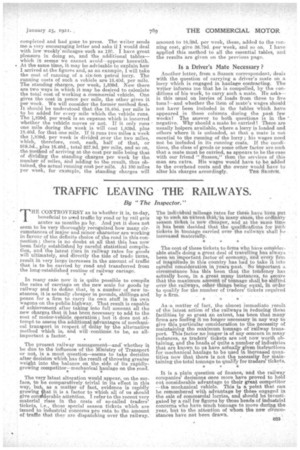TRAFFIC LEAVING THE RAILWAYS.
Page 23

If you've noticed an error in this article please click here to report it so we can fix it.
By "The
Inspector."
T . HE CONTROVERSY as to whether it is, to-day, beneficial to send traffic by road or by rail gets a.ciiter as months go by. And yet it does not seem to be very thoroughly. recognized how many circumstances of major and rumor character are working in favour of the definite choice of the road in this con n eetion ; there is no doubt at all that this has now been fairly established by careful statistical compile, lion, and the latest rises in railway rates for goods will ultimately, and directly the tide of trade turns, result in very large increases in the amount of traffic that is to be carried by road and transferred from the long-established' routine of railway cartage. . * * * In many case now it is quite possible to compile the rates of carriage on the new scale for goods by railway and to define that, in a number of new instances, it is actually cheaper in pounds., shillings and pence for a firm to carry its own stuff in its own wagons on the public. highway. That result is capable of achievement after taking into full account all the new charges that it has been necessary to add to the cost of motor-vehicle operatien • but it does not attempt to assess the additional advantages of mechanical transport in respect of delay by the alternative method which is, and will continue . to be, so allimportant a factor.
The present railway management—and whether it be due to the influence of the Ministry of Transport or not, is a moot question—seems to take decision after decision which has the result of throwing greater w eight into the balance on the side of its rapidlygrowing competitorTmechrical haulage on the road.
The very latest alteration would appear, on the surface, to be comparatively trivial in its effect in this way, but as a matter of fact, evidence is rapidly growing3that it is a factor to which all of 118 should give con &rabic attention, I refer to the recent very material rises in the costs of so-called traders' tickets, i.e.,_ those special season tickets which are issued to industrial concerns pro rata to the amount of . traffic that they are dispatching over the railway.' The individual mileage rates for these have been .pUt up to such, anextent that;".in Many ea.*, the ordinfty se061). rtinket is now CheaPer,. and., at the seine tine it hASbOii decided that the analificafione for `Slab tiCkets in tonnage carried over the railwaysshall be increaged Materially.
The cost of these tickets to firins who have considerable staffs doing a great deal of travelling has always been an important factor of economy, and' every firm of Magnitude in this country has had to take it into careful consideration in years past. So important a circumstance has this been that the tendency has actually been, in a great many instances, to secure that the maximum amount of tonnage shall be shifted over the railways, other things being equal; in order to qualify for the number of traders' tickets required by a firin.
As a matter of fact, the almost 'immediate result of the latest eaten of the railways in reducing these facilities by so great an extent, has been that many firms are finding it no longer necessary in any way to give this particular consideration to the necessity of maintaining the maximum tonnage of 'railway transport. This factor no longer is of any concern in many instances, as traders' tickets are not now worth obtaining, and the heads of quite a number of industries that are kaown to ne have a:dually given instructions for mechanical haulage to be used in increased quantities new that there is not the necessity for maintaining the total tonnage to qualify for traders? ticket.
It is a plain question of finance, and the railway companies' decisions once more have proved to hold out considerable advantage to their great competitor —the mechanical vehicle. This is a point that can be remembered with, advantage by those engaged in the sale of commercial lorries, and should be investigated by a call for figures by those heads of industrial concerns who have Much tonnage to move during the year, but to the attention of whofli the new circumstances have net been drawn.
































